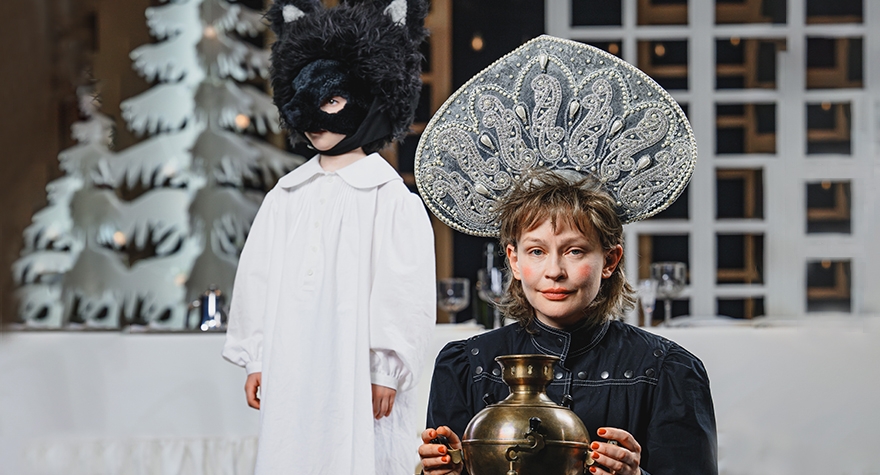

Vassa reimagines the dramatic conflict of Gorky's celebrated Vassa Zheleznova, continuing the popular theme of the tragic breakdown of a family in classical Russian literature. The same Vassa remains at the center of the story: a strong-willed Russian woman, a merchant and owner of a shipping company. But today, the creators of the play aim to see a "human woman," in Vassa: a wife, a mother, struggling to salvage her crumbling dream of a cohesive home where everyone works, where holidays and sorrows are shared equally, where the aggressive outside world is countered by the ability to work and live according to one's conscience, never forgetting that "life is not a mother, but rather a stern mistress."
The play unfolds during a family holiday, when the desperate pain and piercing loneliness of a disunited family break through the Christmas bustle, artificial cheerfulness, and sarcastic humor. Vassa Zheleznova, played by Yulia Peresild, is, above all, a tragic heroine who defies fate, trying to overcome the circumstances of life and accomplish the impossible—to mend a world that is crumbling, disintegrating, and is cruel to its heroes.
"I feel sorry for this woman. I feel sorry for her for imagining herself a god who can decide people's destinies. I feel sorry for Vassa, who got entangled in this life, trying to save her home, family, and business, all of which she carried on her shoulders. Strong-willed and powerful by nature, Vassa was confident she could emerge victorious from any situation, but circumstances proved stronger. Her heart couldn't bear the burden or the sin she had taken upon herself," says Yulia Peresild.
Playwright Konstantin Steshik prepared the literary basis for the production. It draws on both versions of Vassa Zheleznova (1910 and 1935) and excerpts from other works by Maxim Gorky, including the novel The Life of Klim Samgin. This approach, according to the creators, is dictated by the author himself, who thoroughly rewrote his play a quarter of a century later, taking into account revolutionary changes.
In addition to the dramatic component, the musical score plays a crucial role in the this version of Vassa, revealing the characters' personalities. It features works from various eras and genres, including the folk song "I will wear the white shawl," the Soviet hits "Steamboat" and "The Volga River Flows," and “School of Life” by the rock band "Nol." The production's leitmotif is the romance "If You Can, Forgive Me," popularized by Izabella Yuryeva.
We would like to thank Andrey Yurganov for his assistance in creating the performance.
We would like to express our gratitude to the R.A. FUND Foundation for the Development and Support of Social and Cultural Projects for their support of the performance.